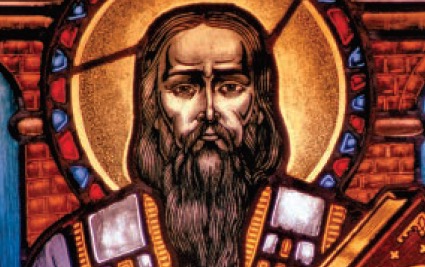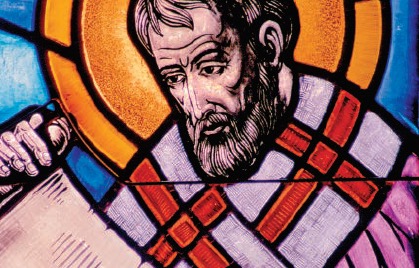St. Macrina was the grandmother of St. Basil the Great, his brothers St. Gregory of Nyssa and St. Peter of Sebaste, and their sister, St. Macrina the Younger. Macrina raised all of her grandchildren (she had 10), and she took special care to give them a sound religious education. Her care paid off: Basil became a monk and wrote a monastic rule that is still followed by monks in the East. Gregory became bishop of Nyssa and then archbishop of Sebaste. Peter preceded his brother as archbishop of Sebaste. All three brothers were champions of the Catholic faith against Arianism, a heresy that was raging across the Christian world at the time. And Macrina the Younger became abbess of a small community of nuns near the Black Sea.
St. Macrina had been converted by St. Gregory Thaumaturgus (the name means “wonder-worker”), a renowned preacher. It was said that when he was made bishop of Caesarea, there were only 17 Christians in his diocese, but when he died there were only 17 pagans in his diocese he had not managed to convert.
In 303, Emperor Diocletian began his empire-wide persecution of Christians. It would be the last Roman persecution of the Church, and it would prove to be the most ferocious. Thousands of Christians were killed, among them some of the most revered martyrs of the early Church, including St. Agnes, St. Sebastian, Sts. Cosmas and Damian, and St. Januarius, known to Italians as San Gennaro. As was true of so many Christians, Macrina and her husband went into hiding. They fled to a remote spot in a vast forest along the shores of the Black Sea, where they remained for seven years. It was a terrible time for the couple. In addition to the constant fear that they would be discovered and dragged off to a horrible death, they often had difficulty foraging for food. Several times Macrina and her husband nearly starved to death.
Only in 311 did they feel safe enough to leave their refuge and return to civilization. Soon thereafter, Macrina’s husband died, and she filled her days raising and educating her grandchildren.
Her feast day is January 14.
St. Macrina the Elder is the matriarch of one of the Church’s most blessed families. Along with her son, St. Basil the Elder, and her daughter-in-law, St. Emmelia, four of her 10 grandchildren have been canonized as saints, including:
 St. Basil the Great: Bishop of Caesarea and Doctor of the Church, St. Basil is known as a great defender of Christianity against Arianism. He was revered for his spiritual achievements and his many contributions to Christian culture in the fourth century. His feast day is Jan. 2.
St. Basil the Great: Bishop of Caesarea and Doctor of the Church, St. Basil is known as a great defender of Christianity against Arianism. He was revered for his spiritual achievements and his many contributions to Christian culture in the fourth century. His feast day is Jan. 2.

The Crosiers
St. Gregory of Nyssa: Bishop of Sebaste and a prolific writer, St. Gregory is credited with being one of the most ardent orthodox leaders of his time due to his outspokenness against Arianism. His feast is March 9

